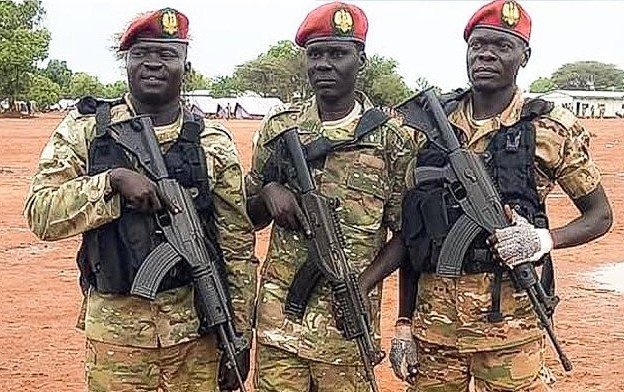South Sudanese soldiers have revealed that they are using Israeli-made 7.62 × 39 mm Galil ACE 32 assault rifles, which were secretly supplied to them by the South Sudanese National Security Service (NSS). The revelation comes amid growing international concern over the role of Israeli arms in fueling the civil war in South Sudan, which has claimed tens of thousands of lives and displaced millions of people since 2013.
The Galil ACE 32 is a modernized version of the Galil assault rifle, which was developed by Israel in the 1960s and 1970s based on the Soviet AK-47. The Galil ACE 32 features improved ergonomics, accuracy, reliability, and compatibility with various accessories and ammunition types. The rifle is produced by Israel Weapon Industries (IWI), a private company that is part of the state-owned Israel Military Industries (IMI).
According to a report by the UN Panel of Experts on South Sudan, the NSS acquired the Galil ACE 32 rifles from IWI in 2013, before the outbreak of the civil war. The NSS then distributed the rifles to the Mathiang Anyoor militia, a government-backed force that was involved in the initial fighting in Juba in December 2013, as well as in subsequent atrocities and human rights violations across the country. The report also stated that the NSS obtained Micro Galil rifles, a compact version of the Galil, from Ugandan stockpiles in 2014, without the authorization of the Israeli government. The report included photographs of South Sudanese officers and soldiers wielding the Galil rifles in various locations and occasions.
The UN report sparked a controversy in Israel, where the Defense Ministry, which oversees the country’s arms exports, refused to comment on the allegations or confirm the identity of the end-users of the weapons. However, in January 2016, Israeli officials told journalists that Israel had indeed supplied the Galil ACE 32 rifles to the NSS in 2013 and that the relevant Israeli ministries had decided to suspend the transfers of lethal equipment to any party in South Sudan in early 2014, in light of the deteriorating security situation and the risk of diversion. The officials also claimed that the weapons were intended for the NSS’s role in combating terrorism and securing the border with Sudan, a shared enemy with Israel, rather than for the civil war.
The Israeli arms supplies to South Sudan have been challenged by human rights activists and lawmakers, who have accused Israel of complicity in the war crimes and crimes against humanity committed by the South Sudanese government and its allies. Eitay Mack, an Israeli lawyer who has been leading a legal campaign against the arms deals, told The Times of Israel that Israel has been providing South Sudan with weapons, ammunition, and training, despite the evidence of widespread violations of international humanitarian law and human rights law. Mack also said that Israel has been violating its laws and regulations, as well as its obligations under the Arms Trade Treaty, which prohibits the transfer of arms to countries where there is a clear risk of serious violations.
Meretz MK Tamar Zandberg has been working with Mack to pressure the Defense Ministry for transparency and accountability, as well as to promote legislation that would restrict arms exports to countries that are involved in armed conflicts or human rights abuses. Zandberg said that Israel has a moral and legal responsibility to stop the flow of weapons to South Sudan and to ensure that its arms industry does not contribute to the suffering of innocent civilians.
The civil war in South Sudan erupted in December 2013, when President Salva Kiir accused his former deputy Riek Machar of plotting a coup. The conflict soon turned into an ethnic war, pitting Kiir’s Dinka tribe against Machar’s Nuer tribe, as well as other groups. The war has resulted in the death of an estimated 400,000 people, the displacement of over four million people, and the creation of a humanitarian crisis that has left millions of people facing famine and disease. Several attempts to broker a peace deal have failed, and the warring parties have repeatedly violated the ceasefire agreements and the human rights of the civilian population.
Similarly, it was recently revealed that fighters of the Rapid Support Forces (RSF) have acquired a 7.62x39mm Israeli IWI Galil ACE 31 carbine with Thermal/NV scope. The rifle may have been sourced from the military stocks in Chad, although it is also possible that it was stolen from the regular Sudanese army or even supplied directly by Israel. The acquisition of the Galil ACE by the RSF is a significant development. The RSF is a powerful militia that is fighting the Sudanese government. This acquisition has sparked debates over the origin of these weapons and the potential implications for the ongoing conflict in Sudan.





